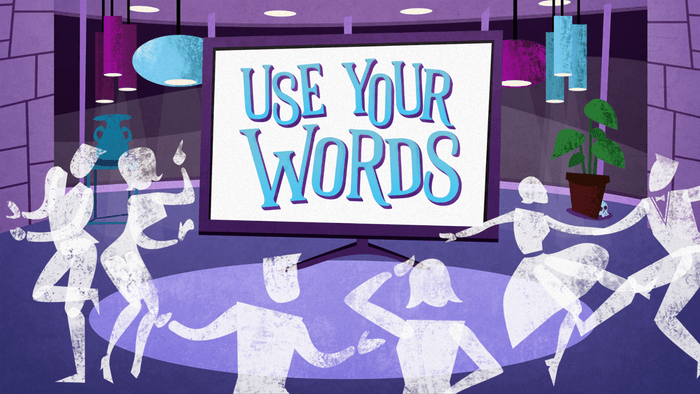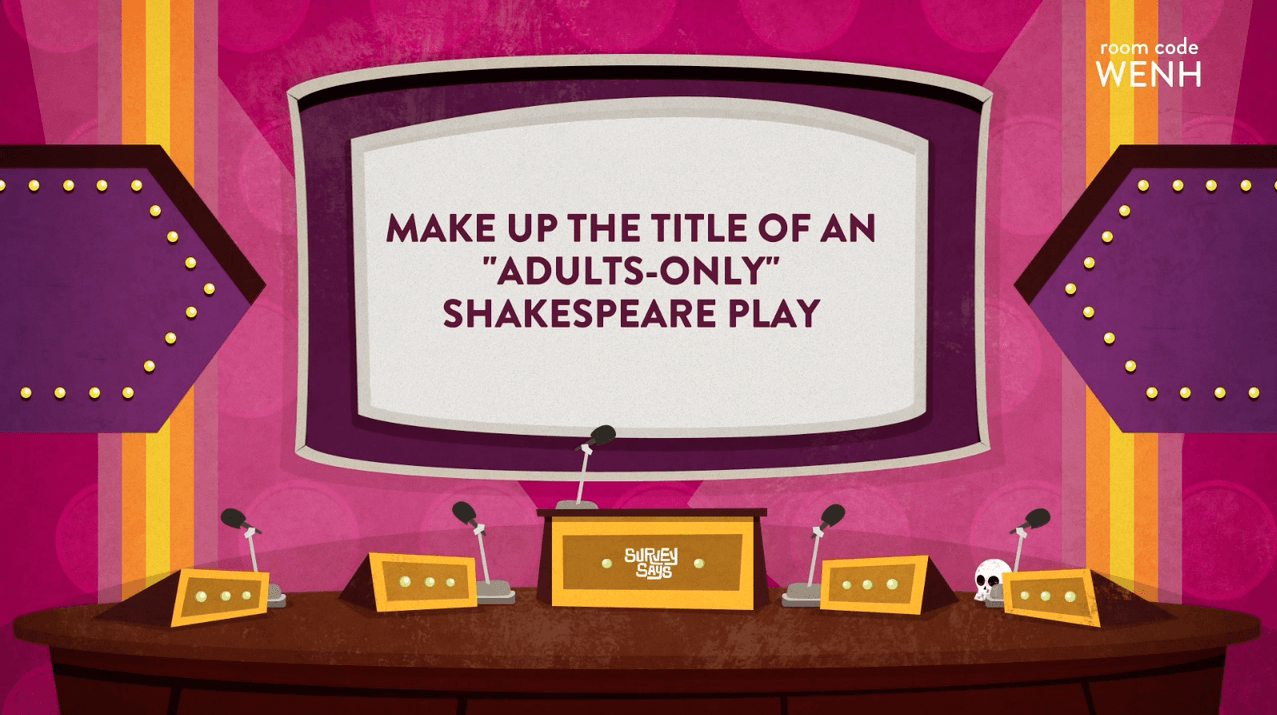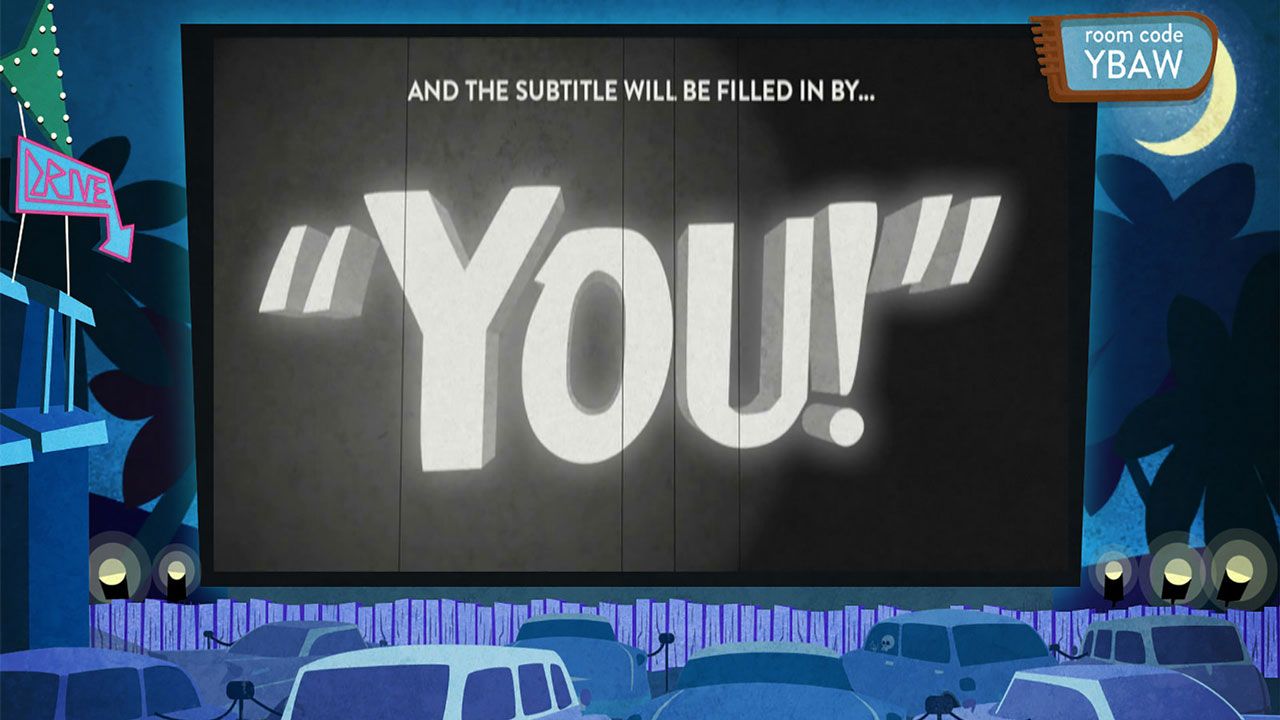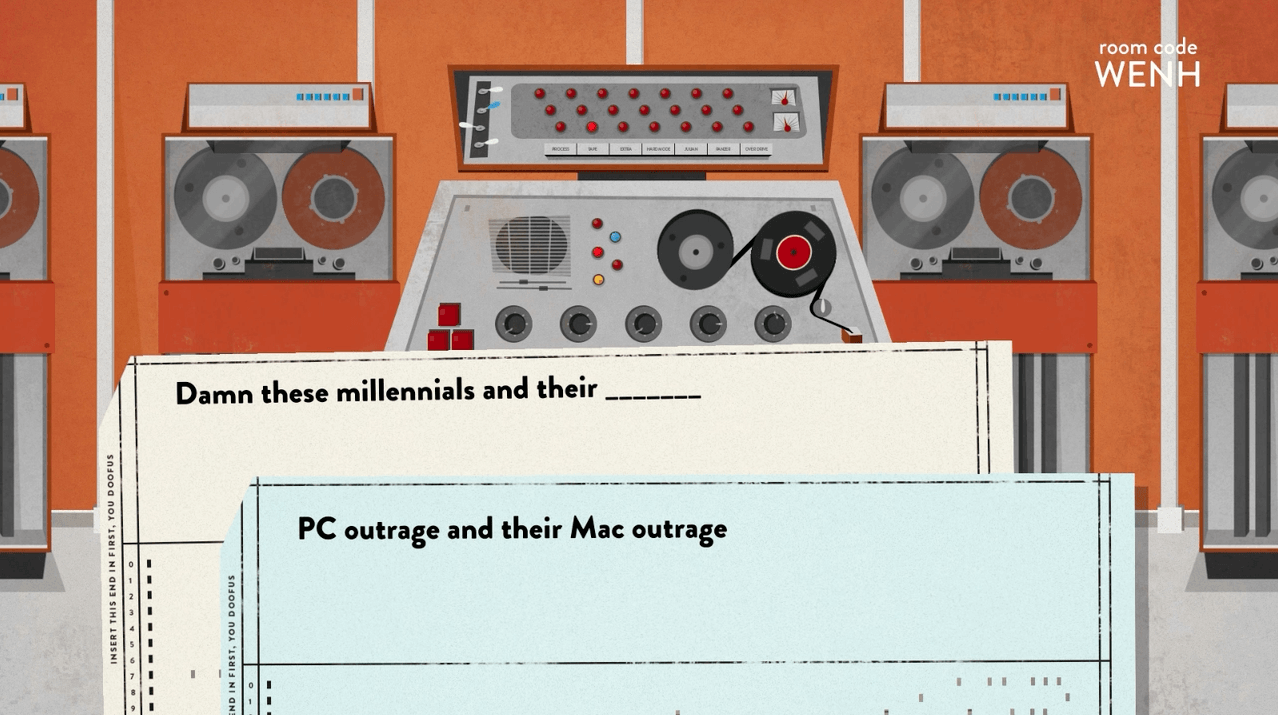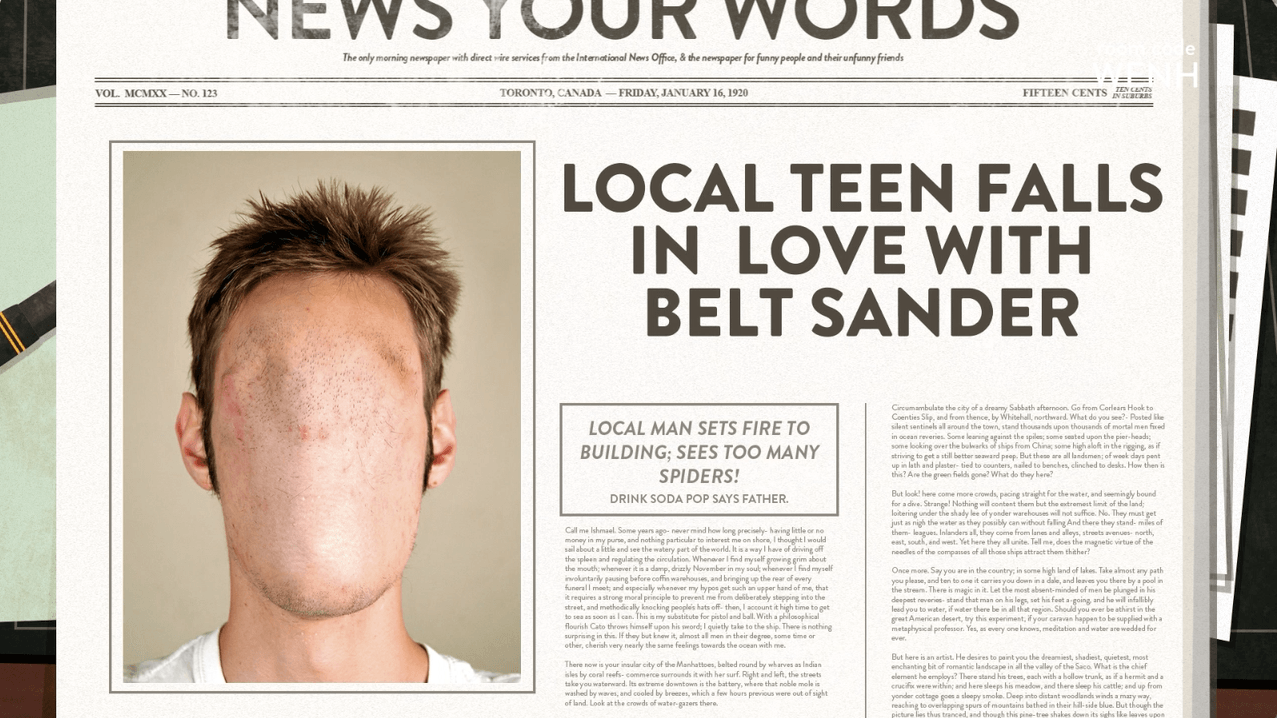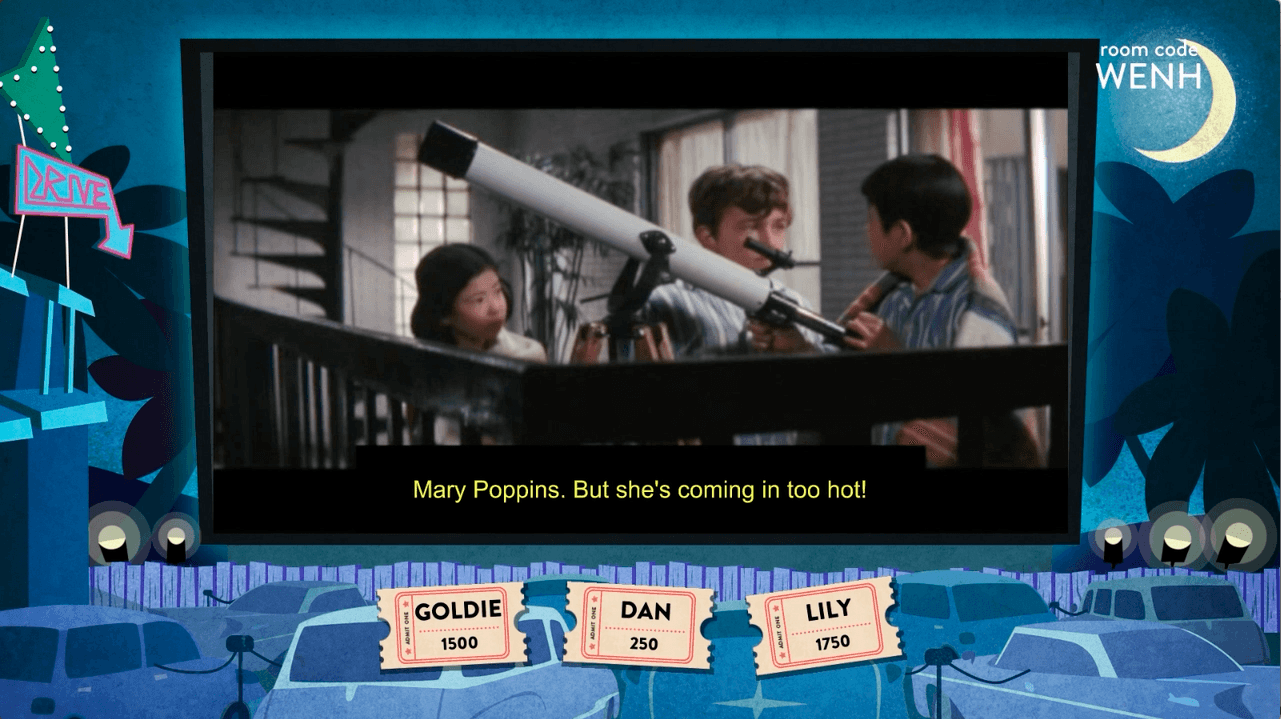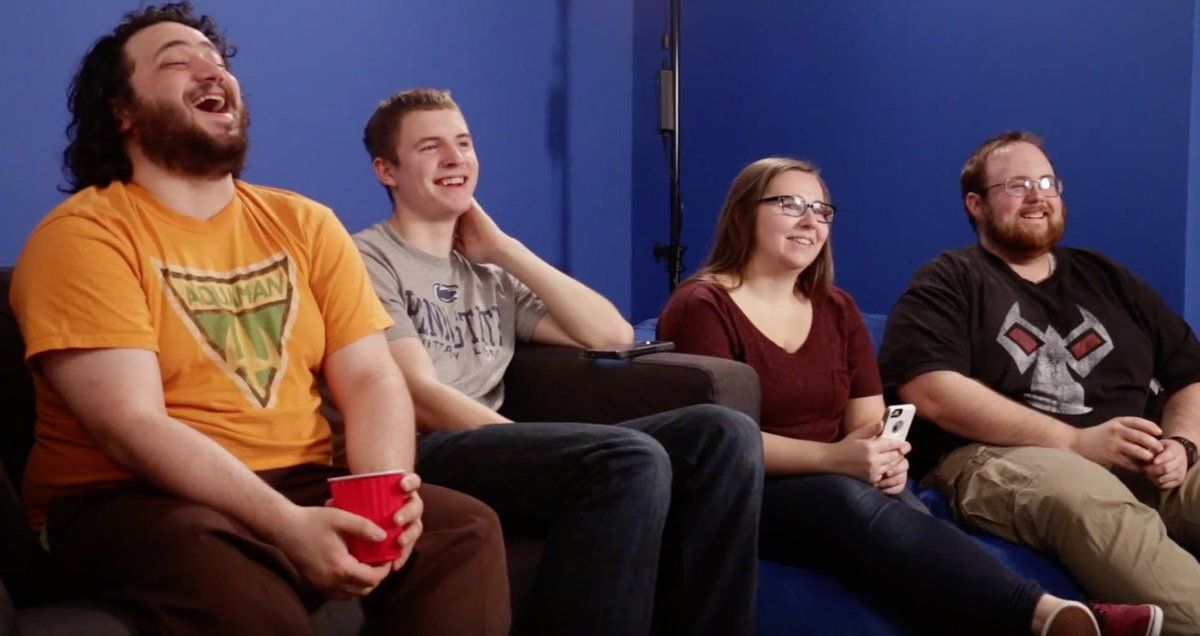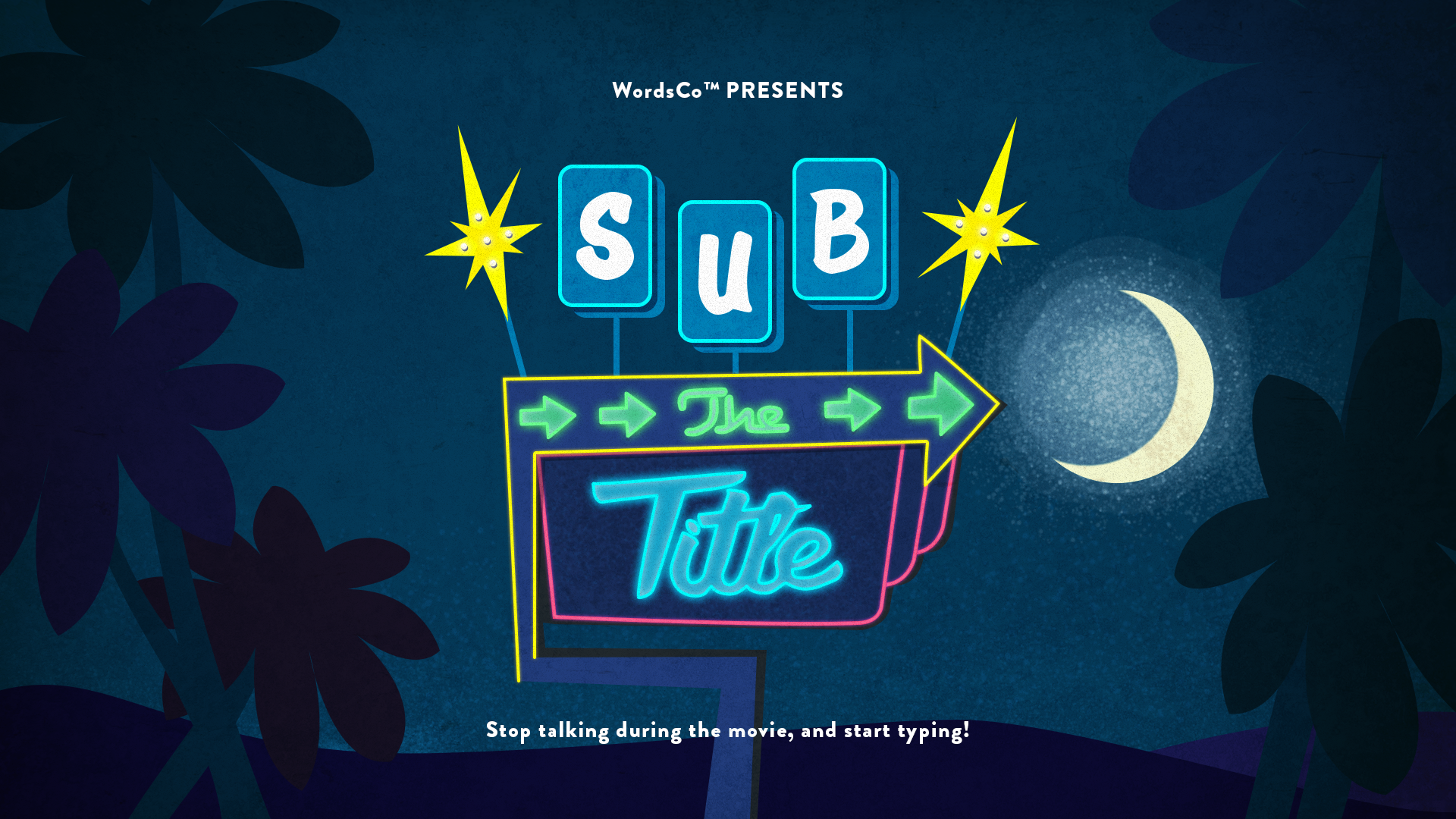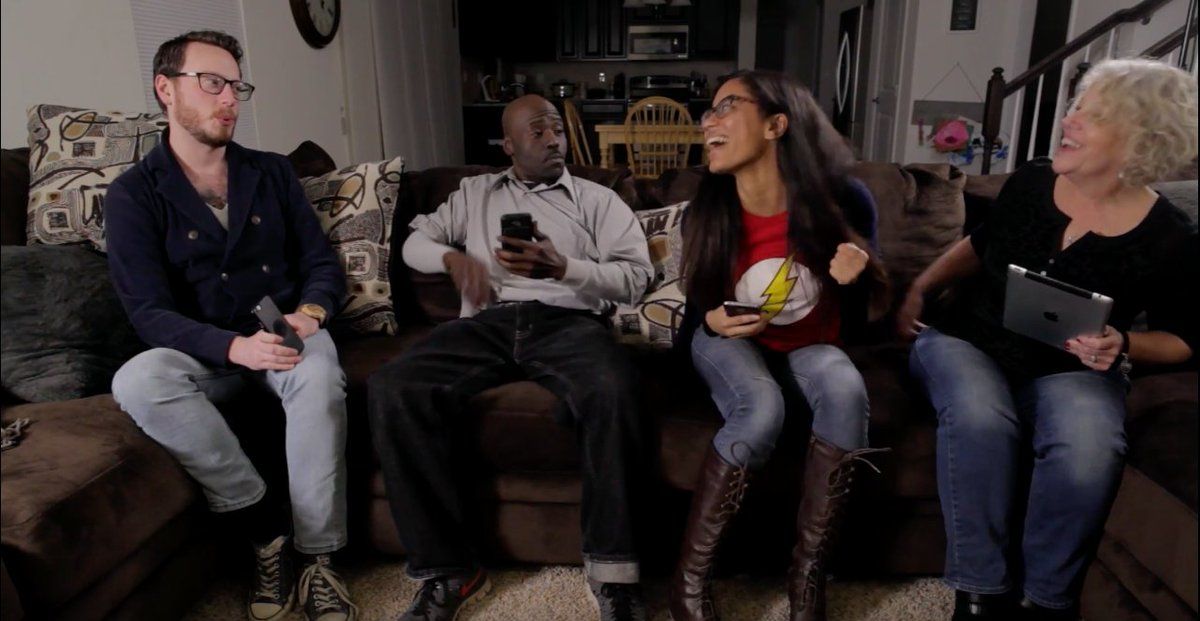When it comes to games as social experiences, party games aim to be the life of the party - literally and figuratively. Whether it's with classic games like Mario Party, more recent hits like The Jackbox Party Pack, or the rising boom of board and card games, the Cards Against Humanity generation of party games has encouraged creativity, fun, and the chance to just have a good time with a great game with friends.
With the right execution and a clever concept, video games can easily become the highlight of a get-together, and for the team at Smiling Buddha Games, their upcoming title Use Your Words is aiming to bring a variety of creative mini-games to liven up any party, even with your "unfunny friends."
DualShockers had the opportunity to learn more about the upcoming party game Use Your Words in an interview with two of the game's development leads; designer Brent Black, also known as YouTube's "brentalfloss," and Julian Spillane, the lead programmer and a veteran game developer who previously worked on projects with Activision, Silicon Knights, and many more.
During our chat with Black and Spillane, we looked into the development process and inspiration behind Use Your Words which, like its title implies, has players using their own words to create the fun.
Use Your Words, debuting on consoles and PC in March, will offer four different mini-games revolving around players getting creative with answers to ridiculous questions.
Ryan Meitzler: Brent and Julian - thanks so much for joining us and for letting us get to know more about Use Your Words. Can you just start off by introducing yourselves and your roles in the game?
Brent Black: Well I'm Brent Black, and I have done a lot of different things artistically: never a video game before! But, I've spent coming up on a decade doing a YouTube channel where I make fun of video games by making music videos with their music and adding lyrics and things like that. My role in Use Your Words is "Designer," but really most of it is being head writer and being in charge of the words on the surface, not so much the words in the code.
RM: Right, so "using your words": exactly.
BB: Yes, exactly!
Julian Spillane: I'm Julian Spillane - I'm the opposite of Brent; I've been in the games industry for far too long, making console games, mobile games, and I've run many studios in the past. This was kind of a unique opportunity - I very rarely work on ideas brought to me because you know everyone has their own ideas and their own dream games. But, when Brent pitched this to me, I fell in love with it and decided we had to make it. So, the team just started off with Brent and I.
I was doing all the coding and infrastructure and getting everything together. And once we got on Kickstarter, we were able to bring on an artist to actually make it look pretty - another programmer to really handle a lot of the additional heavy lifting while I was doing bureaucratic stuff, project management stuff, coding, and all kinds of different tasks. So, I mean my official credit is "Team Lead," but really it's Jack-of-All-Trades.
https://www.kickstarter.com/projects/559253918/use-your-words/widget/video.html
The original Kickstarter pitch video for Use Your Words, which launched its crowdfunding campaign in April 2016 and was successfully funded at over $46,000.
The official trailer for Use Your Words before the game's release this coming spring.
RM: One of the things that I read from the Kickstarter page was that Julian, it seems like you've been on the game development side for quite a while, and then Brent, this is sort of your first experience working on a game. What's that dynamic been like in working on Use Your Words?
BB: I would say that, for me, a lot of it has been using the things I have done artistically as analogues, and then always going to Julian trying to figure out what the analogue of my experience is. Most of my training actually is musical theatre writing, and you know this game is kind of like a little show - it just happens to star the people at home playing it.
But, you know when we playtested I kind of looked at it that way, like "How's the show doing?" "Are they liking the show?" "Are they laughing at the show?"
Even when I was in charge of the audio editing, I realized halfway through that I kept calling all the audio files "cues" - like a stage manager would. Little things like that - so, for me, the dynamic of me being new and Julian really knowing his stuff has been, for me, one of trying to kind of educate myself as I go along, while using the experiences of sort of similar-ish kinds of projects that I've done in the past.
[pullquote]"This game is kind of like a little show - it just happens to star the people at home playing it."[/pullquote]
Use Your Words is an upcoming party game for 3-6 players, with up to 1,000 spectators able to watch and offer their reactions to the most outrageous and funny responses to prompts.
JS: For me, it's been equal parts fun and occasionally frustrating. It's funny because I have a lot of preconceived notions about working in the games industry and like, "Oh, I just assume who I'm working with knows X, Y, & Z." And obviously, you get that because you're in the industry for so long and you accumulate it.
I found myself being like "Oh yeah, actually no: the person who hasn't developed a game wouldn't know this. Why should I make that assumption?" So, there's been a lot of really interesting learning about bettering my communication of intent and how we work on things.
Which has been actually a very good learning experience for me as well, because taking all of these things that I take for granted within our little sphere of development has me being able to communicate that in a way that can help Brent understand why I'm doing X or why we're going with Z, but also in a way that is productive.
So, it's actually been really, really fun! Probably one of the most fun games I've ever worked on, just in terms of the dynamic, the creativity, and the iteration. I don't think I've ever iterated so much on a design than I have working with this team, and I think that's because we learned early on that when a feature isn't working, we cut it: we find something new to replace it.
And it's been a huge process of that. Brent especially has done so much content curation and it's kind of unique in that regard, because other games I've worked on - like the $17-$20 million budget games - it's like you decide scope early. And then you don't add: you cut, you cut, and you cut, because you've gotta make that budget and that deadline.
[pullquote]"We learned early on that when a feature isn't working, we cut it: we find something new to replace it."[/pullquote]
RM: I can definitely see that from the Kickstarter page and pitch video, and then seeing from the trailers that sort of the "core" experience of the game is still there, but it seems like the game has gone through a lot of tweaking and design changes and things like that along the way.
What were some of the inspirations that led to Use Your Words, and how did you guys pick a party game as your first project for the company?
BB: Well, I think the premise of that last part assumes that the company happened and then the game happened. Really, the order of events was, as I see anyway is that I always loved, growing up - particularly in high school and college - I loved any party game where I got to be original, where I got to "use my words." Games like Balderdash, and there's a game called the New Yorker Cartoon Caption Game, where you caption blank comic strips. There's a very obscure DVD game from 2004 called Quip It!, that you know, was kind of like one of those "before its time" games that just didn't have the technology to really be as good as it could have.
But, I had always loved that sort of game, and for me, when I kind of put it together that there are new technologies that make it where you don't have to use pen and paper; you don't have to roll the dice; you don't even have to have a deck of cards. You can really use all of the technology that - you know, the smartphone and tablet generation - offers you and make a seamless experience. I kind of went, "Oh man, if that's the case" - it's sort of like I realized that I had been brooding a comedy game all along, and just never realized that it was modding Balderdash, or modding the rules to the Cartoon Caption Game or doing my own house rules for Cards Against Humanity.
It all kind of came together in a feverish weekend in 2015, and so I created a video in Final Cut, because I didn't know any other way to pitch a game idea: I didn't even know what a game design document was. I just knew that if I could make a video that looked like how it would look to make the game, that would sort of be a way to pitch the concept.
I showed a few friends and not all of them fully "got it" - it wasn't fully self-explanatory, but I showed it to Julian and he was like "We could make this game," and then everything kind of clicked. So, that was February of 2015: and the rest, as they say, is history.
JS: Gosh, yeah it's been two years. That's insane. [Laughs]
BB: Yeah: crazy, right?
[pullquote]"I loved any party game where I got to be original, where I got to 'use my words.'"[/pullquote]
JS: It was kind of like almost spontaneous: once Brent showed me that video, I was like "Oh man, there is huge potential here, and this game could be great." So then I thought, "Oh: how do you make this?" [Laughs]
You know, I've done a lot of stuff but I've never really delved into this kind of very server-based, very multiplayer driven [game]. Like, I've worked on games with multiplayer before, but it's always been secondary to the single-player campaign. So, this is a lot of discovery and "Okay: how do we make this as efficient as possible? How do we make this work?"
The original build would crash and disconnect so frequently, it was horrifying. It's horrifying when I can watch videos of the very first MAGFest panel where we were debuting, and it's Brent mostly doing a tap dance routine to I think cover up for all the disconnects. Our process was we just got a prototype off the ground as quickly as we could, to see if this was even viable. And once that happened, it was like: "Oh wow, yeah. It worked."
BB: Yeah, very early on a turning point was a convention called Too Many Games where we had a room full of, you know, our friends and contacts/colleague kind of people at the hotel of this convention. And then, the hotel security came and had to shut the room down because we were that loud laughing at this very clunky, early prototype.
So, for me that was a huge thing. I'm sure you can make a side-scroller that people can sort of play for like 10 minutes and then politely nod and go: "Yeah, no that's very fun and good job!" But it's hard to fake laughing at a comedy game: you can pretty quickly tell whether people are having fun or if their patience is being tested.
[pullquote]"It's hard to fake laughing at a comedy game: you can pretty quickly tell whether people are having fun or if their patience is being tested."[/pullquote]
RM: We've seen a lot of party games coming to consoles and PC - obviously a big one is The Jackbox Party Pack and other things like that. One of the things I think I've seen is people making those types of comparisons to Use Your Words, with games like Jackbox or Cards Against Humanity. How have you guys tried to position the game as sort of a different experience compared to those games?
BB: I mean, obviously there are many games that have influenced what we're doing. I feel like, one turning point for us is that Julian came up to New York to visit me in early 2015, and we were having lunch or something, and I just sort of had this thought: it started out almost like a slogan.
I still to this day don't know whether I did it backwards or the right way, but in my mind it was like: what if we call it "A Party Game for Funny People and Their Unfunny Friends?" To me, the thing about some comedy party games is if you're around your extremely witty, sophisticated friends who are all very punny and quick on the draw, any comedy game can be a really good time.
But, I've also brought around certain games to friends of mine and the second you tell them you have to be funny, the spotlight just kind of becomes like they feel this "anxiety." Kind of like when some people don't like to dance in public: sometimes you just create this anxious creature who's not gonna have fun.
So, for me, what types of support we were creating from a fundamental standpoint is that we were trying to figure out "how do we make a game that is fun for the smart-asses and class clowns," but also equally accessible and fun for somebody who just doesn't think they're that funny or would actually be anxious to be called upon to create comedy.
[pullquote]"We were trying to figure out 'how do we make a game that is fun for the smart-asses and class clowns,' but also equally accessible and fun for somebody who just doesn't think they're that funny or would actually be anxious to be called upon to create comedy."[/pullquote]
JS: I mean, really our ultimate goal at what the idea would be is to "dethrone" the party game kings that are out there, right? I mean, Cards Against Humanity has reigned supreme for many years as the like, "we have friends together, we might go out to the bar later: let's play a game of something real quick and have some fun" game. We want to dethrone those guys and become the new party kings: absolutely.
You know, on the Quiplash side of things and Jackbox - we get that a lot. I mean, obviously because it's probably the closest comparison you can make. It's just imminently frustrating because we started on this project well before Quiplash even existed: like a twinkle in their eye.
BB: Yeah, it wasn't announced yet - they announced it a little bit after we sort of settled on the concept and it was like "Errrgh," but ultimately, I mean like: it turned out they were doing something so distinct from what we were doing that it's like, "Okay, they're doing their thing: cool. We've got our distinct thing by them." But yeah, it is frustrating when people can't really see beyond the similarities - I try to remind myself it's easy to forget Cards Against Humanity is essentially a mod of Apples to Apples, despite its huge popularity.
[pullquote]"Our ultimate goal at what the idea would be is to 'dethrone' the party game kings that are out there."[/pullquote]
RM: So you have sort of the four "core" mini-games in Use Your Words - but you also have some additional features like the "Family Mode" and "Let's Play Mode" - can you go into a little more detail about those and what led you guys to develop those in the game?
JS: Let's start with Family Mode. So, when we were making this game, we were trying to make it as friendly as possible to everyone, but I mean "blue humor" - things that are raunchy, things that are you know, a little dirtier than most - tend to get the most laughs. We know why people play Cards Against Humanity: people like to get a little edgy.
But we also wanted to make this game playable with Grandma, playable with your parents - the kind of thing you can take home to maybe some "conservative" family members who might not want to see certain words. So, what we do is we have a Family Mode that filters out anything objectionable - it doesn't filter out your answers, but it just ensures the content you receive will be safe to play with anyone: anyone in the world would hopefully not be offended by anything in Family Mode.
On the Let's Play Mode side of things: this was a conscious decision on the part of Brent and I because we wanted to make this game friendly for streamers, and friendly for YouTubers. Part of the fun of this is just seeing the sense of humor emerge, and I think that a lot of fans of YouTubers and streamers would love to hear what the sense of humor of their biggest, most famous streamer is.
We wanted to make this safe, so all the music gets replaced with Content ID-friendly tracks, so you can monetize without worrying about muting the audio or turning off music. It also extends the timer so that we can compensate for stream lag; so if you're playing live with a group of people, it extends the timers by 30 seconds just to make it playable.
[pullquote]"We know why people play Cards Against Humanity: people like to get a little edgy."[/pullquote]
RM: It seems like you've done a lot promoting the game through YouTube, Twitch, and other streamers - what has their response been to the game so far?
BB: Generally positive. The biggest surprise to me is watching people play it wrong and really enjoy it is like the strangest pleasure. [Laughs]
In one of our pre-retail builds: basically, we still allowed players to play one or two player games, even though three will be the minimum. So we watched like one guy who didn't get the memo that he needs two other people, crack himself up for like half an hour; you know was quite a treat. Even though you're sitting there going like, "No! No! No! What are you doing?" - but to see him enjoy it anyway was a singular experience.
But, to answer your question generally we get lots of people say that they like it, and usually the best compliment is that they want to try it again the second that it's over.
JS: They've also been really appreciative of the Let's Play Mode inclusion, which I'm glad because I was hoping that that'd be really noticed and would benefit them. We want to make it as easy for them to engage their audience as possible with the game.
[pullquote]"The best compliment is that [players] want to try it again the second that it's over."[/pullquote]
RM: Since the game can support up to 1,000 people playing as spectators - have you been able to get a 1,000 player game together yet?
JS: Not yet. We actually don't have a spectator counter in the game - it's something that we're thinking of adding for a future update, just so you can actually know who's all in. But we definitely have tried with 100: it's kind of chaotic. But what spectators do is that they get to assign reactions to answers that other players have entered. So they get to determine, "Oh, was this answer funny? Was this gross? Was this offensive?"
And then at the end of the game, awards are given out - kind of like Stars in Mario Party - that you were the Most Offensive Player: BAM. You were the Grossest Player: BAM. And it's just kind of a way for spectators to participate without having thousands of answers clutter up the screen.
RM: As far as after the game's release - do you guys have any plans for DLC or additional game modes or anything like that for Use Your Words?
BB: Yeah: we are looking at additional mini-games. Additional things that basically slightly enhance gameplay or slightly deepen where if you're one of those players that spent the whole summer every day with your friends playing the game, not only would there be additional content, but also new things to try out and things that slightly color and elaborate on the core gameplay that's already there.
JS: We are aiming for [release in] March. The one caveat I put on that is that it's all dependent on the console platform holders' approval timelines. We're going into submission very, very, very soon: so, we're on track for an end of March date, but anything can happen with consoles.
An early look at Use Your Words from a panel at MAGFest 2016.
RM: I know this probably came towards the end of the game's development, but obviously we have the Nintendo Switch on the horizon which seems pretty well-suited to party games. Would you guys consider releasing on the Switch down the line?
JS: Definitely, yeah. So, we're still talking to Nintendo and sorting that out, because they're being very gradual with the rollout of developers working on the Switch right now, and they don't want everyone rushing out to the platform. But, we're talking with them and getting some progress there: we want to release on the Wii U, PC, Mac, PS4, and Xbox One first, and then target the Switch as soon as we can.
RM: Awesome, and now for my last question - what have been some of the funniest responses or jokes you've seen from play tests of the game so far? Do you have any particular favorite response you've seen?
BB: Oh God: the question is do I have any that I could repeat?
RM: Anything goes here! [Laughs]
[pullquote]"The fun thing is that some of the best things we saw in playtesting ended up in the game as answers."[/pullquote]
BB: Jeez, I mean I've got to get the one I'm thinking of out of my mind: not because...or should I just say it. I mean, sometimes things in context are just so vile that they're funny because you can't believe that it came out of a friend of yours' brain.
I'm gonna go ahead and drop this one, and let's just buckle up. But, it was "Make up an un-appealing name for a sex toy," and one of our friends wrote "Baby's First Orgasm." And it was in the moment - we were drunk at least - and it was just such a shock that I fell over.
JS: That's great. I have a hard time - the fun thing is that some of the best things we saw in playtesting ended up in the game as answers. I can't remember what the exact answer was, but that one that [our friend] Ant did that slayed me...that we ended up putting into the game...
BB: Oh, oh yeah - there's a subtitle prompt where this kind of martial arts lady with a sword just jumps into the shot, and suddenly she's looking at this guy who's got this enormous snake wrapped around him like in this kind of menacing way: clearly the snake is some kind of evil sidekick. And our friend Ant, the subtitle he wrote was just "Be careful, there's a snake around here somewhere." [Laughs]
In context, it was just too perfect.
JS: Yeah, I died.
BB: I was like, "How did we not think of this for a House Answer?" And yeah - we basically said "Hey man, can we put that in the game because it's too funny." So now he's credited in the game as an additional writer because we stole one of his answers for a House Answer.
JS: One thing we should talk about very quickly is just the sheer number of staff writers we had contributing to the game. They don't get a lot of limelight right now because the game isn't out and people can't see the credits, but we do have quite a bevy of talented people writing prompts and House Answers for the game.
BB: It's true, it's true. And you know, before we hired any outside writers it was essentially, statistically all me. Like, probably 99 point something all House Answers and prompts came from me. So, I remember when the game really started to get up and rolling you'd have people play for an hour and then they'd know each answer because they'd know my writing style. Disguising my comedy wasn't enough, so we decided that we would start with diversity - and the more diverse our writing staff got, the funnier and more strategic the game got.
Or, maybe by "strategic" what I mean is that [the game] always has a way to fool you at least every now and then. So, it's mostly women and basically all kinds of people - I guess what I'm saying is that it was a really good lesson for me to find out that the idea that "diversity improves comedy" is not just abstract - it's absolutely real and is a huge part of why the game is so solid at this point.
JS: We wanted it to be full of different perspectives because we can only really write from the perspective that we have. It's just great to have the game feel like that - I was playing the game last night with some friends and I fell for five House Answers. [Laughs] So, it's working.
BB: Still happens to me sometimes. There's thousands of them, but yeah - it's humbling when you're a developer of the game and it fools you.
[pullquote]"The idea that 'diversity improves comedy' is not just abstract - it's absolutely real and is a huge part of why the game is so solid at this point."[/pullquote]
Use Your Words is currently in development for PS4, Xbox One, Wii U, PC, and Mac, with the game expected to release in March 2017.

